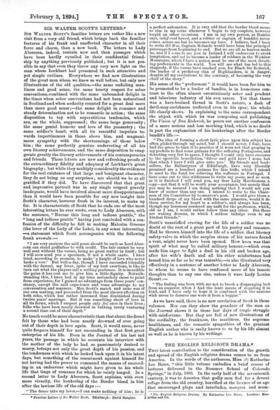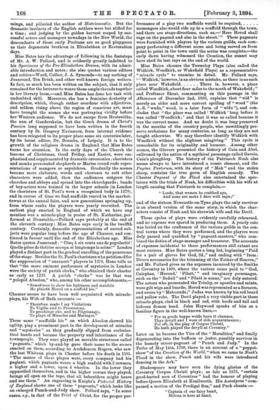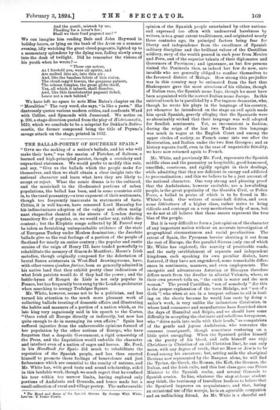THE ENGLISH RELIGIOUS DRAMA.* Tars latest contribution to the consideration
of the growth and spread of the English religious drama comes to us from America. In the words of the authoress, Miss (?) Katharine Lee Bates, "this little volume embodies a, brief course of lectures delivered in the Summer School of Colorado Springs," in July, 1893. In the early half of the seventeenth century, it was to America that godly men fled for a devout refuge from the old country, horrified at the licence of an age that encouraged plays and interludes, masques and mum-
• The English Religious Drama. By Katharine Lee Bates. London: Mao. mill= and Co.
mings, and pilloried the author of Histriomastix. But the &pit-ode instincts of the English settlers were but stifled for a time ; and judging by the golden harvest reaped by sue- sessful actors and managers nowadays in the New World, the descendants of those early Puritans are as good playgoers as their degenerate brethren in Elizabethan or Restoration clays.
Miss Bates has the advantage of following in the footsteps
of Mr. A. W. Pollard, and is evidently greatly indebted to his Specimens of the Pre-Elizabethan Drama, with its admir- able introduction and notes ; she also quotes various editors and critics—Ward, Collier, J. A. Symonds—to say nothing of Jusserand, Ten Brink, and other well-known foreign writers.
In fact, so much has been written on the subject, that it only remained for the lecturer to weave these ample threads together in her literary loom,—and Miss Bates has done her task with undoubted skill. Moreover, she has a feminine dexterity of description, which, though rather overdone with adjectives, and seldom rising above the region of conscious art, must have brought the scenes she was portraying vividly before her Western audience. We do not escape from Hrotswitha, the nun of Gandersheim, but the Greek drama of Christ's Passion long supposed to have been written in the fourth century by St. Gregory Nazianzen, from internal evidence
has been relegated to its proper place some six centuries later, by its latest editor, Dr. Brambs, of Leipzig. It is to the
growth of the religions drama in England that Miss Bates turns her attention. In the early days of the Church the lessons of Christmas, Good Friday, and Easter, were em- phasised and supplemented by dramatic ceremonies ; choristers and monks personated shepherds or Manes round rude repre- sentations of mangers or sepulchres. Gradually the scenes became more elaborate, words and choruses to suit other characters were added, then the audiences outgrew the churches and abbeys and spread into the churchyards ; bands of boy-actors were trained in the larger schools (in London the choristers of St. Paul's were a recognised body in 1378), and in course of time we find scaffolds reared in the market- towns at the annual fairs, and new generations springing up, from whose ranks the players were yearly recruited. The earliest play enacted in England of which we have any mention was a miracle-play in praise of St. Katharine, per- formed at Dunstable,—Pollard says probably at the end of the eleventh century; Miss Bates says early in the twelfth century. Certainly, dramatic representations of sacred sub- jects were popular long before the age of Chaucer, and con- tinued in favour until the end of the Elizabethan age. Miss Bates quotes Jusserand : " Cinq e. six cents ans de popularito ! Quelle piece de theatre occupa si longtemps la scene!" London played a distinct part in the gradual unrolling of the panorama -of the stage. Besides the St. Paul's choristers who petitioned for the suppression of " unexnert " players in 1378, Hone tells us that "the more eminent performers of mysteries in London were the society of parish clerks," who obtained their charter as early as 1233. A parish " clarke " was he that was Acyclepid Absolon," who, among his other accomplishments,—
" Sometimes to show his lightness and maistrie He plaieth Herod on a scaffold hie."
Chaucer seems to have been well acquainted with miracle- plays, his Wife of Bath recounts :— "Therefore made I my Visitations To Vigilis and to Processions,
To prechings eke, and to Pilgrimagis, To plays of Miracles and Mariages."
Those same "scaffolds hie" on which Absolon showed his agility, play a prominent part in the development of miracles and "mysteries" as they gradually slipped from ecclesias- tical hands and became the property and inheritance of the townspeople. They were played on movable structures called "pageants," which by-and-by gave their name to the scenes enacted on them, according to Archdeacon Rogers, who saw the last Whitsun plays in Chester before his death in 1595. "The maner of these playes were, every company had his
pagiant, which pagiante weare a high acafold with 2 rowmes, a higher and a lower, upon 4 wheeles. In the lower they apparelled themselves, and in the higher rowme they played, beinge all open on the tope, that all behoulders might heare and see them." An engraving in Knight's Pictorial History of England shows one of these "pageants," which looks like an enlarged Punch-and-Judy show. Pollard says, "In some cases, e.g., in that of the Trial of Christ, for the proper per-
formance of a play two scaffolds would be required, messengers also would ride up to a scaffold through the town, and there are stage-directions, such as,—' Here Herod shall rage on the pagond and also in the street." These pageants were furnished with players by the various guilds, each com- pany performing a different scene and being moved on from
point to point in the town until the series was complete,—the early dawn having witnessed the Creation, the sunset may
have shed its last rays on the end of the world.
Miss Bates chooses the Towneley Plays (also called the Widkirk, Woodkirk, or Wakefield Plays) as a representative "miracle cycle" to examine in detail. Mr. Pollard says, " Widkirk,' however, is an obvious mistake, as there is no such place near Wakefield There is, however, a place called Woodkirk, about four miles to the north of Wakefield ; " and Professor Skeat, commenting on this passage in the Atheneum of December 2nd, 1893, explains that " wid" is merely an older and more correct spelling of " wood " (the A.-S. " wudu," wood, is a later form of " widu "), and con- cludes that "the place was called Widkirk' long before it was called Woodkirk ; ' and that it was so called because it was the correct name. And no doubt it was long preserved in the mouths of the country people, who unwittingly pre- serve archaisms for many centuries, as long as they are not taught otherwise. We may therefore identify Widkirk with Woodkirk without the slightest misgiving." This cycle is remarkable for its originality and humour. Among other scenes, the Glovers presented the history of Cain and Abel, enlivened by the antics of a mythical personage called Garcio, Cain's ploughboy. The history of the Patriarch Noah also seems always to have introduced .a comic element, and the Pagina Pastorum, with its story of " Mak " and the stolen sheep, contains the true germ of English comedy. The Chester Pageant of the Flood also entertained the spec- tators with the trials of Noah, his difficulties with his wife at length causing that Patriarch to complain,—
" Lorde, that women be crabbed aye,
And none are meke I dare well saye ;"
and of the sixteen Newcastle-on-Tyne plays the only survivor is an absurd version of the same story, in which the char- acters consist of Noah and his shrewish wife and the Devil.
These cycles of plays were evidently carefully rehearsed, and no expense was spared in producing them. A yearly rate was levied on the craftsmen of the various guilds in the cen- tral towns where they were performed, and the players were duly passed and qualified by "pageant-masters," who com- bined the duties of stage-manager and treasurer. The accounts of expenses incidental to these performances still extant are most curious. Miss Bates quotes a long list, beginning "Paid for a pair of gloves for God, 2d.," and ending with " Item : Divers necessaries for the trimming of the Father of Heaven;" and Mr. Pollard gives us the expenses incurred by the Smiths at Coventry in 1490, where the various sums paid to "God, Caiaphas, Heroud," Pflatt," and imaginary personages, such as the " Bedull" and " Pilatt is Bonne," are duly entered. The actors who personated the Trinity, or apostles and saints, wore gilt wigs and beards; Herod was represented as a Saracen, and swore by " Mahounde ;" Judas was known by his red beard and yellow robe. The Devil played a very visible part in these miracle-plays, clad in black and red, with hoofs and tail and hideous demon head. John Heywood speaks of him as a familiar figure in the well-known lines,—
" For as goode happe wolde have it chaunce, Thys devyll and I were of olde acquaintaunce ; For oft, in the play of Corpus Christi, He hath played the devyll at Coventry."
Later on he became the Vice of the "Moralities," and finally degenerating into the buffoon or jester, possibly survives in the homely street-pageant of "Punch and Judy." In the Tatler of May 14th, 1709, there is an account of a " poppet- show " of the Creation of the World," when we came to Noah's Flood in the show, Punch and his wife were introduced dancing in the Ark."
Shakespeare may have seen the dying glories of the Coventry Corpus Christi plays ; as late as 1575, "certain good-harted men of Coventree " had the honour of playing before Queen Elizabeth at Kenilworth. His Autolycus "com- passed a motion of the Prodigal Son," and Puck chants :—
"Captain of our fairy band, Helena is here at hand, And the youth, mistook by me, Pleading for a lover's fee ; Shall we their fond pageaLt seen"
We can imagine him reading Bale and John Heywood in holiday-hours, or lying on the bank of the Avon on a summer evening, idly watching the great cloud-pageants, lighted up to a momentary splendour by the dying sun, fading slowly away into the dusk of twilight. Did he remember the visions of his youth when he wrote ?—
" These our actors,
As I foretold you, were all spirits, and Are melted into air, into thin air ; And, like the baseless fabric of this vision, The cloud-capp'd towers, the gorgeous palaces, The solemn temples, the great globe itself,
Yea, all which it inherit, shall dissolve,
And, like this insubstantial pageant faded, Leave not a rack behind."
We have left no space to note Miss Bates's chapter on the "Moralities." The very word, she says, "is like a yawn." She
dextrously quotes various modern critics, and confronts Ward with Collier, and Symonds with Jusserand. We notice on p. 206, a stage-direction quoted from the play of Histriom,astix, 1610, which we conclude to be a misprint for Dekker's Satiro- snastix, the former compound being the title of Prynne's savage attack on the stage, printed in 1632.




































 Previous page
Previous page